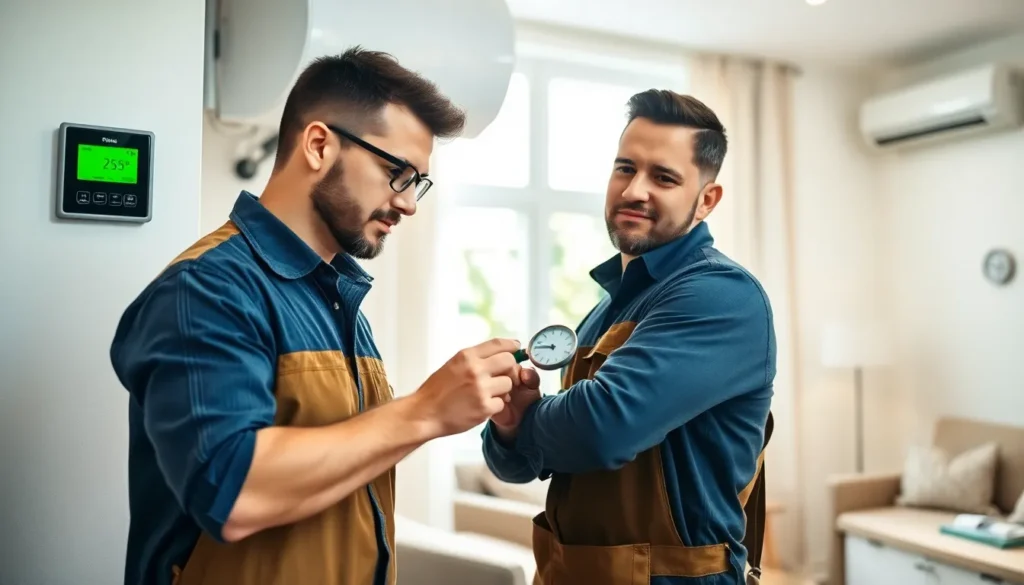
Let’s face it: HVAC systems can sometimes feel like an enigma wrapped in a riddle. Just when they seem to work perfectly, they throw a curveball. Whether it’s during an unexpected summer heatwave or a frigid winter night, knowing how to handle HVAC systems can save one from both discomfort and financial woes. This guide offers HVAC tech tips that are not just practical but also aimed at making you the guru of your home’s climate control. Ready to immerse and make your space as cozy as a well-worn blanket?
HVAC Tech Tips

Imagine walking into your home after a long day, only to be greeted by a perfectly tempered breeze. That’s the magic of HVAC systems, which stand for heating, ventilation, and air conditioning. These systems are not just pieces of machinery: they are the unsung heroes of home comfort.
The key components of HVAC systems include the furnace or heat pump for heating and the air conditioner for cooling. The ventilation system circulates air, ensuring that all spaces within a home maintain a consistent temperature. Armed with this foundational knowledge, one can begin to appreciate how integral these systems are to maintaining comfort, particularly during extreme weather. Understanding each component helps in diagnosing issues when they arise.
Common HVAC Issues and Solutions
Even the best HVAC systems experience hiccups from time to time. Knowing what can go wrong could save everyone a lot of stress.
1. Poor Airflow: This issue often stems from clogged filters or ductwork. The solution? Replace filters regularly, every 1 to 3 months, in high-use seasons.
2. Uneven Temperatures: If one room feels like a sauna while another is icy, the problem might lie in duct issues or insulation. Checking the integrity of the ducts and ensuring they are properly sealed can make a considerable difference.
3. Strange Noises: From rattles to hums, odd noises can hint at potential problems. Common culprits include loose panels or worn-out bearings in the motor. Tightening screws or lubricating parts can often resolve noise issues.
Energy Efficiency Tips for HVAC Systems
As energy costs continue to rise, making HVAC systems more energy efficient is crucial. There are several strategies that homeowners can carry out:
1. Upgrade to a Programmable Thermostat: This device helps manage energy use by adjusting temperatures based on one’s schedule, ensuring that systems aren’t running unnecessarily when no one is home.
2. Seal Leaky Ducts: Up to 30% of a home’s heating and cooling energy can be lost through leaks in the ductwork. Sealing these leaks can provide substantial savings.
3. Schedule Seasonal Maintenance: Getting a professional check-up before the heating and cooling seasons can prevent major issues, ensuring everything runs efficiently when needed most.
Routine Maintenance Practices
Routine maintenance is vital for extending the lifespan of any HVAC system. While some of these tasks can be done by homeowners, others should be left to professionals:
1. Regular Filter Changes: It cannot be overstated how critical it is to keep filters clean. Not only does this improve air quality, but it also maximizes system efficiency.
2. Clean the Coils and Fins: The outside unit of an air conditioner should be free of debris. An annual cleaning can help prevent buildup that could impair performance.
3. Inspect the Thermostat: Confirming that the thermostat is working correctly ensures that the HVAC system responds accurately to the home’s needs.
Advanced Troubleshooting Techniques
After addressing basic issues, it’s time to investigate deeper into troubleshooting. Here are some advanced techniques that can be invaluable for HVAC technicians:
1. Pressure Testing: Using gauges to check pressure in various parts of the system can point to underlying problems that may not be immediately visible.
2. Checking Refrigerant Levels: Low refrigerant can hinder cooling efficiency. Technicians should know how to check levels properly and understand when a recharge or repair is needed.
3. Electrical Component Testing: Knowledge of electrical diagnostics can help in identifying fault connections or malfunctioning components, saving extensive downtime and costly replacements.
The Importance of Professional Inspections
Many homeowners think they can handle every issue from minor repairs to complete overhauls. But, there are distinct advantages to having regular professional inspections.
1. Expertise: Professionals have the training to identify issues that may elude the untrained eye. They can recognize patterns and prevent small problems from escalating into costly repairs.
2. Comprehensive Service: A thorough inspection goes beyond just checking the system: it includes evaluating efficiency and offering recommendations for improvements.
3. Warranty Compliance: Skipping professional inspections might void warranties, leading to additional expenses down the line.












